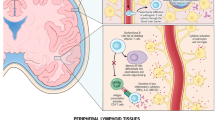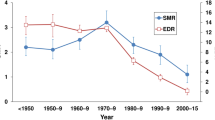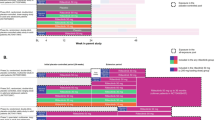Abstract
Introduction
Immune checkpoint inhibitors (ICPI), a breakthrough immunotherapy for cancer, can cause serious neurological adverse events (AEs). We aimed to investigate the characteristics of the neurological and related AEs associated with ICPI treatment, using a large pharmacovigilance database from Japan.
Methods
We conducted disproportionality analysis using the Japanese Adverse Drug Event Report (JADER) database containing 566,698 patient cases recorded between April 2004 and March 2019, to detect neurological and related AE signals associated with ICPI treatment by calculating reporting odds ratio (ROR).
Results
Among 7604 cases with ICPI usage, we identified 583 cases (7.67%) with a significantly high reporting of neurological and related AEs (lower 95% of the ROR > 1), including myasthenia gravis (MG), inflammatory myositis, non-infectious encephalitis/myelitis, non-infectious meningitis, hypophysitis/hypopituitarism, and peripheral neuropathy including Guillain–Barre syndrome (GBS). Among the ICPI subtypes, when compared to nivolumab as a reference, number of hypophysitis, hypopituitarism, and meningitis reports from the use of ipilimumab and number of encephalitis/myelitis and meningitis reports from the use of anti-programmed cell death-ligand-1 (PD-L1) agents were significantly higher. Additionally, time to AE onset of symptoms post administration was short in meningitis (median 21 days), MG (median 28 days), myositis (median 28 days), and encephalitis/myelitis (median 32.5 days), while it was longer in peripheral neuropathy (median 42 days), hypophysitis (median 94 days), and hypopituitarism (median 112 days).
Conclusions
Our results showed characteristic features of neurological and related AEs associated with each ICPI subtype, reported in a large number of Japanese patients. This would help in prompt identification and treatment of neurological AEs associated with ICPI treatment.


Similar content being viewed by others
References
Ribas A, Wolchok JD (2018) Cancer immunotherapy using checkpoint blockade. Science 359(6382):1350–1355
Xu C, Chen YP, Du XJ, Liu JQ, Huang CL, Chen L, Zhou GQ, Li WF, Mao YP, Hsu C, Liu Q, Lin AH, Tang LL, Sun Y, Ma J (2018) Comparative safety of immune checkpoint inhibitors in cancer: systematic review and network meta-analysis. BMJ 363:k4226
Wang DY, Salem JE, Cohen JV, Chandra S, Menzer C, Ye F, Zhao S, Das S, Beckermann KE, Ha L, Rathmell WK, Ancell KK, Balko JM, Bowman C, Davis EJ, Chism DD, Horn L, Long GV, Carlino MS, Lebrun-Vignes B, Eroglu Z, Hassel JC, Menzies AM, Sosman JA, Sullivan RJ, Moslehi JJ, Johnson DB (2018) Fatal toxic effects associated with immune checkpoint inhibitors: a systematic review and meta-analysis. JAMA Oncol 4(12):1721–1728
Zimmer L, Goldinger SM, Hofmann L, Loquai C, Ugurel S, Thomas I, Schmidgen MI, Gutzmer R, Utikal JS, Göppner D, Hassel JC, Meier F, Tietze JK, Forschner A, Weishaupt C, Leverkus M, Wahl R, Dietrich U, Garbe C, Kirchberger MC, Eigentler T, Berking C, Gesierich A, Krackhardt AM, Schadendorf D, Schuler G, Dummer R, Heinzerling LM (2016) Neurological, respiratory, musculoskeletal, cardiac and ocular side-effects of anti-PD-1 therapy. Eur J Cancer 60:210–225
Kao JC, Liao B, Markovic SN, Klein CJ, Naddaf E, Staff NP, Liewluck T, Hammack JE, Sandroni P, Finnes H, Mauermann ML (2017) Neurological complications associated with anti-programmed death 1 (PD-1) antibodies. JAMA Neurol 74(10):1216–1222
Cuzzubbo S, Javeri F, Tissier M, Roumi A, Barlog C, Doridam J, Lebbe C, Belin C, Ursu R, Carpentier AF (2017) Neurological adverse events associated with immune checkpoint inhibitors: review of the literature. Eur J Cancer 73:1–8
Spain L, Walls G, Julve M, O'Meara K, Schmid T, Kalaitzaki E, Turajlic S, Gore M, Rees J, Larkin J (2017) Neurotoxicity from immune-checkpoint inhibition in the treatment of melanoma: a single centre experience and review of the literature. Ann Oncol 28(2):377–385
Astaras C, de Micheli R, Moura B, Hundsberger T, Hottinger AF (2018) Neurological adverse events associated with immune checkpoint inhibitors: diagnosis and management. Curr Neurol Neurosci Rep 18(1):3
Dalakas MC (2018) Neurological complications of immune checkpoint inhibitors: what happens when you 'take the brakes off' the immune system. Ther Adv Neurol Disord 11:1756286418799864
Larkin J, Chmielowski B, Lao CD, Hodi FS, Sharfman W, Weber J, Suijkerbuijk KPM, Azevedo S, Li H, Reshef D, Avila A, Reardon DA (2017) Neurologic serious adverse events associated with nivolumab plus ipilimumab or nivolumab alone in advanced melanoma, including a case series of encephalitis. Oncologist 22(6):709–718
Makarious D, Horwood K, Coward JIG (2017) Myasthenia gravis: an emerging toxicity of immune checkpoint inhibitors. Eur J Cancer 82:128–136
Suzuki S, Ishikawa N, Konoeda F, Seki N, Fukushima S, Takahashi K, Uhara H, Hasegawa Y, Inomata S, Otani Y, Yokota K, Hirose T, Tanaka R, Suzuki N, Matsui M (2017) Nivolumab-related myasthenia gravis with myositis and myocarditis in Japan. Neurology 89(11):1127–1134
Johnson DB, Manouchehri A, Haugh AM, Quach HT, Balko JM, Lebrun-Vignes B, Mammen A, Moslehi JJ, Salem JE (2019) Neurologic toxicity associated with immune checkpoint inhibitors: a pharmacovigilance study. J Immunother Cancer 7(1):134
Ali AK, Watson DE (2017) Pharmacovigilance assessment of immune-mediated reactions reported for checkpoint inhibitor cancer immunotherapies. Pharmacotherapy 37(11):1383–1390
Garcia CR, Cox JN, Villano JL (2018) Myasthenia gravis and Guillain-Barré syndrome adverse events with immune checkpoint inhibitors. J Clin Oncol 36:37. https://doi.org/10.1200/JCO.2018.36.5_suppl.37
Soldatos TG, Dimitrakopoulou-Strauss A, Larribere L, Hassel JC, Sachpekidis C (2018) Retrospective side effect profiling of the metastatic melanoma combination therapy ipilimumab-nivolumab using adverse event data. Diagnostics (Basel) 8(4):E76
Nomura K, Takahashi K, Hinomura Y, Kawaguchi G, Matsushita Y, Marui H, Anzai T, Hashiguchi M, Mochizuki M (2015) Effect of database profile variation on drug safety assessment: an analysis of spontaneous adverse event reports of Japanese cases. Drug Des Dev Ther 9:3031–3041
Rothman KJ, Lanes S, Sacks ST (2004) The reporting odds ratio and its advantages over the proportional reporting ratio. Pharmacoepidemiol Drug Saf 13(8):519–523
Van Puijenbroek EP, Egberts AC, Meyboom RH, Leufkens HG (1999) Signalling possible drug-drug interactions in a spontaneous reporting system: delay of withdrawal bleeding during concomitant use of oral contraceptives and itraconazole. Br J Clin Pharmacol 47(6):689–693
Sznol M, Ferrucci PF, Hogg D, Atkins MB, Wolter P, Guidoboni M, Lebbé C, Kirkwood JM, Schachter J, Daniels GA, Hassel J, Cebon J, Gerritsen W, Atkinson V, Thomas L, McCaffrey J, Power D, Walker D, Bhore R, Jiang J, Hodi FS, Wolchok JD (2017) Pooled analysis safety profile of nivolumab and ipilimumab combination therapy in patients with advanced melanoma. J Clin Oncol 35(34):3815–3822
Hao C, Tian J, Liu H, Li F, Niu H, Zhu B (2017) Efficacy and safety of anti-PD-1 and anti-PD-1 combined with anti-CTLA-4 immunotherapy to advanced melanoma: a systematic review and meta-analysis of randomized controlled trials. Medicine (Baltimore) 96(26):e7325
Joshi MN, Whitelaw BC, Palomar MT, Wu Y, Carroll PV (2016) Immune checkpoint inhibitor-related hypophysitis and endocrine dysfunction: clinical review. Clin Endocrinol (Oxf) 85(3):331–339
Acknowledgements
This study was performed using Japanese Adverse Drug Event Report (JADER) database, which is provided by Pharmaceuticals and Medical Devices Agency (PMDA), a Japanese governmental organization. The information or results of the current study do not represent the opinion of PMDA.
Author information
Authors and Affiliations
Corresponding author
Ethics declarations
Conflict of interest
The authors declare that they have no conflict of interest.
Additional information
Publisher's Note
Springer Nature remains neutral with regard to jurisdictional claims in published maps and institutional affiliations.
Electronic supplementary material
Below is the link to the electronic supplementary material.
Rights and permissions
About this article
Cite this article
Sato, K., Mano, T., Iwata, A. et al. Neurological and related adverse events in immune checkpoint inhibitors: a pharmacovigilance study from the Japanese Adverse Drug Event Report database. J Neurooncol 145, 1–9 (2019). https://doi.org/10.1007/s11060-019-03273-1
Received:
Accepted:
Published:
Issue Date:
DOI: https://doi.org/10.1007/s11060-019-03273-1




